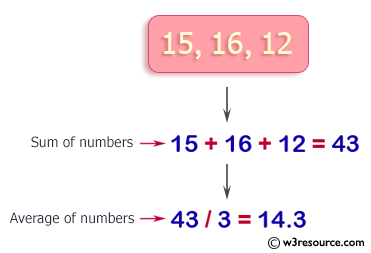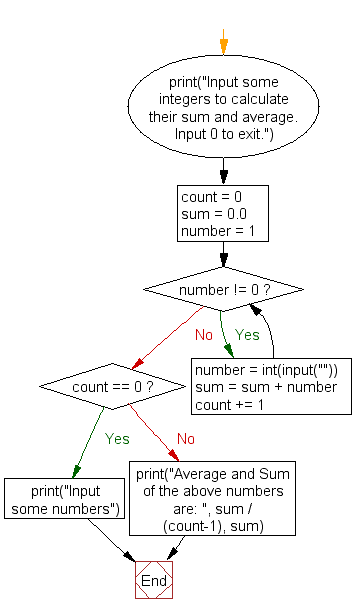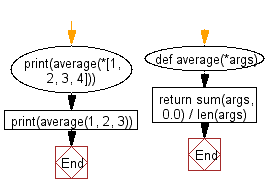Python Exercise: Calculate the sum and average of n integer numbers
42. Sum and Average of n Integers
Write a Python program to calculate the sum and average of n integer numbers (input from the user). Input 0 to finish.
Pictorial Presentation:

Sample Solution-1:
Python Code:
# Display a prompt asking the user to input integers to calculate their sum and average,
# specifying that entering 0 will exit the program
print("Input some integers to calculate their sum and average. Input 0 to exit.")
# Initialize variables for count, sum, and the first number to 1
count = 0
sum = 0.0
number = 1
# Iterate until the user inputs 0
while number != 0:
# Prompt the user to input a number and convert it to an integer
number = int(input(""))
# Add the entered number to the sum
sum = sum + number
# Increment the count of entered numbers
count += 1
# Check if no numbers were entered
if count == 0:
print("Input some numbers")
else:
# Calculate and display the average and sum of the entered numbers
print("Average and Sum of the above numbers are: ", sum / (count-1), sum)
Sample Output:
Input some integers to calculate their sum and average. Input 0 to exit . 15 16 12 0 Average and Sum of the above numbers are: 14.333333333333334 43.0
Flowchart :

Sample Solution-2:
Calculates the average of two or more numbers.
Use sum() to sum all of the args provided, divide by len().
Python Code:
# Define a function 'average' that takes in a variable number of arguments using *args
def average(*args):
# Calculate the sum of the arguments using the built-in 'sum' function, starting from 0.0 as the initial value
# Divide the sum by the number of arguments using 'len(args)' to compute the average
return sum(args, 0.0) / len(args)
# Print the average of the elements within the list [1, 2, 3, 4] by unpacking it with '*'
print(average(*[1, 2, 3, 4]))
# Print the average of the numbers 1, 2, and 3 by passing them directly as arguments to the 'average' function
print(average(1, 2, 3))
Sample Output:
2.5 2.0
Flowchart :

For more Practice: Solve these Related Problems:
- Write a Python program to repeatedly accept integers from the user until 0 is entered, then output their sum and average.
- Write a Python program to accumulate a list of integers entered by the user and compute both total and mean when the input terminates.
- Write a Python program to implement a loop that reads integers until 0 and then calculates and prints the sum and average.
- Write a Python program to use a while loop to collect integers from user input, then compute the sum and average after the loop exits on 0.
Go to:
Previous: Write a Python program to get next day of a given date.
Next: Write a Python program to create the multiplication table (from 1 to 10) of a number.
Python Code Editor:
Have another way to solve this solution? Contribute your code (and comments) through Disqus.
What is the difficulty level of this exercise?
Test your Programming skills with w3resource's quiz.
